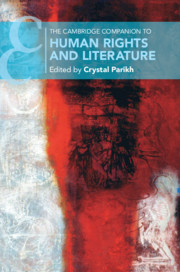Book contents
- The Cambridge Companion to Human Rights and Literature
- The Cambridge Companion to Human Rights and Literature
- Copyright page
- Epigraph
- Contents
- Notes on Contributors
- Chronology of Major Works and Events, 1215–2018
- Introduction
- Part I Genealogies and Contexts
- 1 Recounting History, Locating Precursors for Human Rights
- 2 Humanitarianism’s Way in the World
- 3 Literature, Human Rights, and the Cold War
- 4 Human Rights in the Vernacular
- Part II Fashioning Methods
- Part III Generic Representations
- Part IV Writing Human Rights
- Select Bibliography
- Index
- Cambridge Companions To …
3 - Literature, Human Rights, and the Cold War
from Part I - Genealogies and Contexts
Published online by Cambridge University Press: 24 June 2019
- The Cambridge Companion to Human Rights and Literature
- The Cambridge Companion to Human Rights and Literature
- Copyright page
- Epigraph
- Contents
- Notes on Contributors
- Chronology of Major Works and Events, 1215–2018
- Introduction
- Part I Genealogies and Contexts
- 1 Recounting History, Locating Precursors for Human Rights
- 2 Humanitarianism’s Way in the World
- 3 Literature, Human Rights, and the Cold War
- 4 Human Rights in the Vernacular
- Part II Fashioning Methods
- Part III Generic Representations
- Part IV Writing Human Rights
- Select Bibliography
- Index
- Cambridge Companions To …
Summary
The practical inefficacy of the Universal Declaration of Human Rights was largely due to the development of the Cold War following its adoption in 1948. The author in this chapter studies the generative environment of the UDHR, with the particular geopolitical and cultural dissonances of the post world war world, and follows through to its immediate aftermath. It especially looks at the literary advocacy of human rights that had come up in this period, where the right to write without persecution began to stand for a larger body of diverse rights. Traversing a wide range of literary engagement with human rights in the Global South and North – in testimonio, autobiography, political fiction, radical drama, community theater, war poetry, magical realism, and diasporic literature – the author shows how Cold War literature documents both the ideals and the failures of human rights as thought and action.
- Type
- Chapter
- Information
- The Cambridge Companion to Human Rights and Literature , pp. 42 - 57Publisher: Cambridge University PressPrint publication year: 2019

